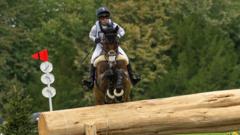Can Great Britain Overcome Their Worst Medal Drought in 20 Years?

Published: 2025-09-21 13:40:45 | Category: sport
Great Britain and Northern Ireland's performance at the World Athletics Championships has recently come under scrutiny, particularly after failing to secure a gold medal for the first time in 22 years during the Tokyo event. With a total of five medals—tied for their lowest since 2005—the team fell short of their expectations and target, marking a notable decline in their competitive edge.
Last updated: 07 October 2023 (BST)
Key Takeaways
- Great Britain failed to win a gold medal at the World Athletics Championships for the first time since 2003.
- The team finished with five medals, their joint-lowest total since Helsinki 2005.
- They achieved their best haul of 10 medals at the previous World Championships in Budapest.
- Injuries affected key athletes, impacting overall performance.
- The team was ranked 21st in the medal table, missing their target of a top-eight finish.
Historical Context of Great Britain's Athletic Performance
Great Britain has a rich history in athletics, often competing at the highest levels on the world stage. The Tokyo World Championships marked a significant downturn in performance, as the nation fell short of expectations set by previous successes. Notably, the last time they finished without a gold was in 2003, a year that also saw them struggle in the relay events.
Recent Championships Performance
Prior to the Tokyo Championships, Great Britain enjoyed considerable success, notably at the World Championships in Budapest, where they secured a total of 10 medals, including two golds. This performance was heralded as one of their best in recent memory, showcasing the nation's depth in talent across various disciplines.
Tokyo 2020: A Shift in Fortune
The Tokyo World Championships proved to be a pivotal moment for the team. With a squad of 64 athletes, they aimed to finish within the top eight of the medal table. However, their performance fell short, concluding the competition in 21st place. The lack of gold medals highlighted a stark contrast to their previous achievements.
Medal Breakdown: Tokyo 2020
Great Britain's medal haul in Tokyo included:
- Silver: Jake Wightman in the men's 1500m
- Silver: Amy Hunt in the women's 200m
- Bronze: Katarina Johnson-Thompson in the heptathlon
- Bronze: Georgia Hunter Bell in the women's 800m
- Bronze: Keely Hodgkinson in the women's 800m
Despite the silver and bronze medals, the absence of golds was a significant disappointment for the British team, especially considering the high expectations surrounding their capabilities.
Challenges Faced by the Team
The Tokyo event was fraught with challenges for the British athletes. Notable injuries impacted several key competitors. Defending champion Josh Kerr faced setbacks, while pole vaulter Molly Caudery was unable to perform at her best due to physical limitations. Additionally, marathon runner Emile Cairess was forced to withdraw from the race due to extreme weather conditions, which included high temperatures and humidity.
Relay Events: A Historic Low
The relay events, previously a stronghold for Great Britain, also fell flat. The men's 4x100m team failed to complete their heat, marking the first time since 2003 that the nation did not secure a medal in any relay event. This shift underscores a concerning trend in a discipline that has historically contributed significantly to the British medal tally.
Comparative Analysis: Recent Championships
When analysing the performance of Great Britain in recent championships, a clear contrast emerges:
- Budapest 2023: 10 medals (2 gold, 3 silver, 5 bronze)
- Tokyo 2020: 5 medals (0 gold, 2 silver, 3 bronze)
- Doha 2019: 5 medals (2 gold, 2 silver, 1 bronze)
This downward trend raises questions about the team’s preparation and strategy leading up to the Tokyo Championships, especially in light of their previous successes.
Future Outlook: What Comes Next for British Athletics?
Looking forward, the challenges faced in Tokyo necessitate a reevaluation of strategies within the British Athletics framework. With upcoming competitions, including preparations for the next World Championships, team dynamics, athlete health, and coaching strategies will be crucial in regaining their competitive edge.
Training and Development
To address the shortcomings of the Tokyo performance, British Athletics may consider enhancing training regimens, focusing on injury prevention, and fostering a resilient team culture. This could involve more comprehensive support systems for athletes, such as mental health resources and personalised training plans.
Investment in Young Talent
Investing in younger athletes and nurturing emerging talent will also be vital for the future success of British Athletics. Identifying and developing promising athletes through grassroots initiatives could ensure a sustainable pipeline of talent for international competitions.
Conclusion
Great Britain's athletics team faces a period of introspection and strategy reassessment following their disappointing performance in Tokyo. The absence of gold medals and the overall low medal count highlight the need for change within the team structure. As preparations for future competitions begin, the focus must be on building resilience, improving training practices, and investing in young talent to ensure that Great Britain can reclaim its status as a powerhouse in athletics.
FAQs
Why did Great Britain fail to win a gold medal in Tokyo?
Great Britain did not win a gold medal in Tokyo due to a combination of factors, including injuries to key athletes and a lack of strong performances in critical events, particularly in the relays.
What was Great Britain's medal count in the Tokyo Championships?
Great Britain finished the Tokyo Championships with a total of five medals: two silver and three bronze.
How does the Tokyo performance compare to previous championships?
The performance in Tokyo was significantly lower than in previous championships, such as Budapest 2023, where Great Britain won ten medals, including two golds.
What are the main challenges facing British Athletics?
The main challenges include addressing athlete injuries, improving training methodologies, and ensuring a strong pipeline of young talent for future competitions.
What changes might be implemented for future competitions?
Potential changes could focus on enhancing athlete support systems, increasing investment in youth development, and refining training programmes to improve performance outcomes.
How will Great Britain work to regain its competitive edge in athletics? With a focus on athlete wellness and development, the future may hold promising changes. #AthleticsUK #TeamGB #WorldChampionships



